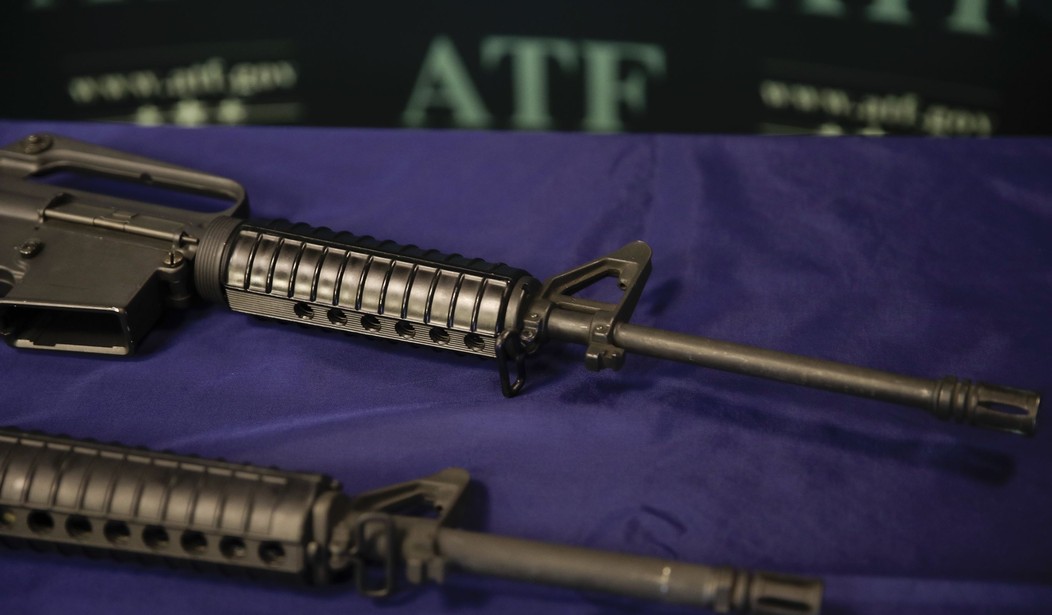I'm a firm believer that words matter. I believe that their meanings matter. It's why I get frustrated over how the word "literally" has gone from meaning something being exactly as said to also include "figuratively," essentially making the word meaningless.
Words matter.
But the issue with words is that some people can play word games with them and make words mean almost anything at all. That's precisely what one amicus brief supporting restriction on so-called ghost guns seems to do.
The progressive Constitutional Accountability Center penned the amicus brief and then wrote about it on their website. There's just one problem. They're wrong on pretty much every argument.
First, our brief describes how ATF’s rule is consistent with the plain text of the GCA. It explains that the ordinary meaning of the GCA’s phrase “may be readily converted” indisputably covers the kits and devices specified in ATF’s rule, which “may be readily converted” into fully functional firearms. Dictionaries from the 1960s defined “readily” to mean “with fairly quick efficiency.” And they defined “convert” chiefly as “to change or turn from one state to another” or to “transform” or “transmute.” Under these definitions, when an amateur working at home transforms a weapons parts kit from an unfinished, disassembled state into a finished state with fairly quick efficiency, that person “readily . . . convert[s]” the kit into a weapon that “expel[s] a projectile by the action of an explosive” within the meaning of the GCA.
Our brief also explains that dictionaries from the 1960s consistently defined the terms “frame” and “receiver” broadly enough to cover partially complete or nonfunctional frames and receivers. Those dictionaries focused on the purpose that the “frame” or “receiver” serves and the manner in which it is used: as the basic skeleton of a firearm to which other parts are attached to create a functional machine. They say nothing about the “completeness” of a “frame” or “receiver” or require it to be ready-to-use, and they plainly would have encompassed a frame or receiver that was missing just a few drill holes, or that required the removal of just a few plastic tabs, or that could be readily assembled from a kit containing all the key parts.
See? Word games
First, "readily" hasn't really changed in definition, but I respect them taking an originalist approach by providing a definition for the period of a law's creation. THey should try "well-regulated" next, just for laughs.\
The issue here is that the term "readily" isn't very specific, so there's going to be some interpretation as to whether the process of turning an incomplete lump of polymer into a firearm is too quickly done or not. I'd argue it's not, especially since I've built a gun from an 80 percent receiver before. While it could be more complicated, to say the least, it's not because pistol frames aren't exactly complicated in the first place.
As for "frame" and "receiver," I don't think that discussion is really relevant. Few argue which term applies to what. What we argue is that there has to be a line where something isn't a receiver anymore. Once that is determined, anything beyond that line doesn't count. As it stands, the incomplete receivers are on the other side of that line.
You can argue that when GCA was passed, they didn't differentiate any of this, but that's because they, too, understood that at some point, a piece of metal or plastic was a receiver and anything short of that point meant that it wasn't.
You can't change that with simple word games or trying to distract people by listing definitions and understandings of words from the period.
Of course, I have no doubt they'd love it if anything that could be deemed an incomplete receiver were regulated. The problem is that eventually, that would encompass pretty much every piece of metal, plastic, or any other material some enterprising individual could come up with as a receiver material. I mean, there have been people who build AK receivers out of shovels, for crying out loud.
So where is the line?
See, by arguing to expand what "readily" encompasses as well as what "frame" or "receiver" mean, the author is trying to move the goalposts until literally anything could be regulated. I don't think that's by coincidence, either.
Frankly, I hope he gets used to disappointment, because while I'm not as trusting that the Court will side with gun rights after Rahimi, I don't see this particular argument flying quite as well as he'd like to imagine it would.







